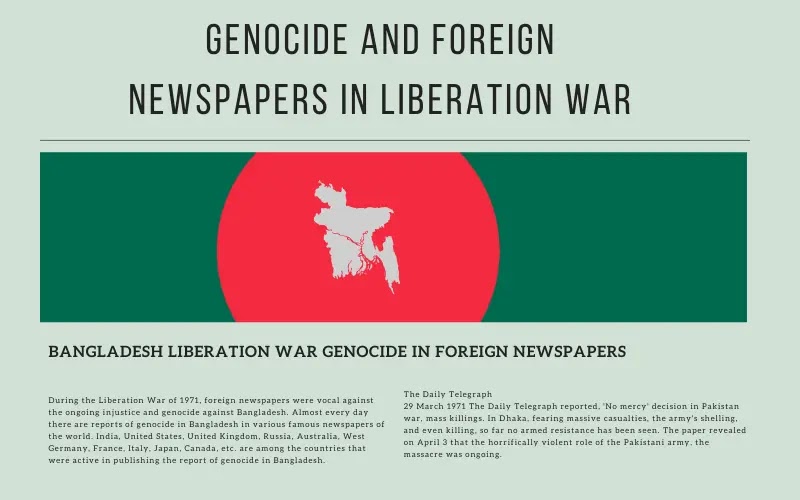Genocide and Foreign Newspapers in Liberation War
Mention the details of Bangladesh Liberation War genocide in foreign newspapers. Or,
Write an article on 'Genocide and Foreign Newspapers in Liberation War'.
During the Liberation War of 1971, foreign newspapers were vocal against the ongoing injustice and genocide against Bangladesh. Almost every day there are reports of genocide in Bangladesh in various famous newspapers of the world. India, United States, United Kingdom, Russia, Australia, West Germany, France, Italy, Japan, Canada, etc. are among the countries that were active in publishing the report of genocide in Bangladesh.
Details of Bangladesh Liberation War Genocide in Foreign Newspapers
The details of the terrible massacres of the Liberation War in 1971 have appeared in foreign newspapers. This is discussed below
The Daily Telegraph
29 March 1971 The Daily Telegraph reported, 'No mercy' decision in Pakistan war, mass killings. In Dhaka, fearing massive casualties, the army's shelling, and even killing, so far no armed resistance has been seen. The paper revealed on April 3 that the horrifically violent role of the Pakistani army, the massacre was ongoing.
International Herald Tribune
The International Herald Tribune of 30 March 1971 revealed that the Pakistani army had virtually destroyed Dhaka with infantry, artillery and American M-24 tanks without warning. The university area was their main target. If we calculate the whole of Dhaka, the death toll can be 1.5 million in one night.
The Times
5 April 1971 The Times editorial mentioned, Pakistan on the brink of the abyss. Although the number of casualties is not known due to the complete non-cooperation of the Pakistani government, it is estimated that around 1.5 million people lost their lives. But President Yahya seems to be expecting more deaths. But it seems that the birth of Bangladesh cannot be prevented.
Times of India
An American officer named John Road was in Dhaka for 3 years under the American Aid (AID) programme. In his testimony before the US Senate Committee on Foreign Relations (Times of India, 2 May 1971), he said that jungle law was in force in East Bengal. Unarmed civilians, intellectual Hindus are being killed in a well-planned manner. He visited Ramana Kalibari on 29 March 1971 and found that 200 to 300 people had been killed there.
Sunday Times
A Pakistani correspondent in the Sunday Times newspaper (13 June 1971) said that hundreds of Muslims who were arrested during the evening curfew during the erasure of some areas in Old Dhaka were not found later. On April 15, 1971, while touring Dhaka, he saw a lot of blood still strewn on the two steps of Iqbal Hall and the heads of four students still rotting on the roof of the hall.
Sunday Telegraph
London's Sunday Telegraph newspaper on 4 April 1971 wrote an extensive discussion and comment on the mentality and conspiracy of Pakistani gangsters, 'Last week the West Pakistani army brutally all but drained the vitality of the independence movement of East Pakistan seeking self-determination as the People's Republic of Bangladesh. This atrocity is the result of two years of careful planning by Pakistan's generals and colonels.
Le Express
A journalist from France's La Express described his experience like this: Every night I heard machine-gun mortar fire as the soldiers chased the Bengalis away, then tied them to the back of vehicles so that their heads hit the ground repeatedly.
TIME
On May 3, 1971, New York's weekly TIME reported that a young man pleaded with the soldiers to spare his 17-year-old sister, no matter what was done to her. Paul killed his sister with a rayon in front of him.
Newsweek
In 1971, the mass killings and wild jubilation of the Pak invasion forces were increasing. Then the conscience of the world was shocked, humanity began to be insulted. In this situation, on April 26, 1971, Newsweek published, Pakistan: The scourge of lice and the reign of mad dogs.
Amritbazar Patrika
Amritbazar Patrika first published the news of the massacre after March 25. On March 28, Amritbazar Patrika feared that 100,000 people had been massacred within 2/3 days of the start of the genocide across Bangladesh. April 10 same The newspaper published the news of the killing of intellectuals and students in Dhaka University.
Foreign newspapers gave their brave reports about the massacres that took place in Bangladesh during the liberation war. As a result, Bangladesh got the unwavering support of the people of the world in the liberation war, the freedom-loving Bengali crowd was ignited and the desired independence was achieved.
Foreign newspapers gave their brave reports about the massacres that took place in Bangladesh during the liberation war. As a result, Bangladesh got the unwavering support of the people of the world in the liberation war, the freedom-loving Bengali crowd was ignited and the desired independence was achieved.
